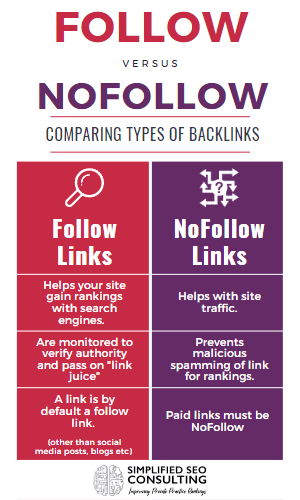SEO Marketing for Therapists: Guide to How Backlinks Work
Of the many things that Search Engine Optimization (SEO) brings, confusion is definitely one of them while how backlinks work… is not.

What are Backlinks? Understanding How Backlinks Work.
Whether you’re linking to another website or your own site is being linked to, linking is a critical part of search engine optimization (SEO). Backlinks result from a website linking to your website. In most cases, if you’re mentioned in a blog post or a web article, your website will link back to it. This is usually because the two websites are somehow connected. For example, they may be related based on the content they provide.
More Information About How Backlinks Work.
An authoritative, trustworthy source provides information regarding a topic through a backlink. Consequently, the website becomes more reliable and a ‘backlink’ is created. It’s important to know how backlinks work to determine a website’s credibility and trustworthiness.
As a mental health professional, it is important to portray the quality of care provided to clients through your website. That may be their first impression of your business, and the deciding factor as to whether they would like to backlink to your site. Consequently, your site will receive a lot more traffic as well as improved ranking for various keywords in search engine results because Google knows it is trustworthy.

What type of backlinks does a site need?
Getting effective backlinks becomes more challenging as backlinks come in different quality levels. While it is true, you want more backlinks. However, Google is more likely to trust a quality backlink from a news site or a university website than a link from a new site.
It is easy to get confused when it comes to the difference between follow and Nofollow links. How a website treats those links is also crucial since it can determine how search engines will treat those links. The focus here is on the relationship between Follow and Nofollow links and your site.
What are Follow links? How are they impacting your SEO?
The use of follow links is one of the best ways to improve a website’s domain authority or domain rating which in turn, enhances keyword ranking. This is accomplished by passing the authority of the origin site to the destination site.
Fun Fact: In the web world, this passing of authority is known as “link juice.”
What are NoFollow links? Do they do anything to your SEO?
Nofollow links do not help rankings and don’t pass authority on to the website they are linking to. These links do not benefit SEO. Examples of these links are ones that are posted on Facebook posts.
However! It’s normal for a site to have a healthy mix of both types of backlinks and that’s what Search Engines look for, the useful, normal sites that people are more likely to search for. Having NoFollow links is still a great way to connect with potential clients.
What is the purpose of a NoFollow link in How Backlinks Work?
Getting NoFollow links isn’t a bad thing! Despite not giving you SEO benefits like Follow links, you can get traffic to your website and diversify your backlink portfolio with NoFollow links.
Hyperlinks with the rel=”NoFollow” attribute are not indexed in Google results if they have this attribute. But, this isn’t a negative vote for the site. Instead, it is a way to prevent other people from attempting to raise their own search engine rankings by commenting on related blogs.
Fun Fact: Google implemented this as a response to website owners’ complaints about comment spam and unfair SEO tactics in September 2005.
How can you tell if a link is either Follow or NoFollow?
Short Answer? You can’t unless you’re looking at the HTML coding itself.
The easiest way to determine if a link is follow or nofollow is to inspect the link in the browser and check the HTML code within the link.

A Follow link looks like this:
<a href=”https://simplifiedSEOconsulting.com”>Simplified SEO Consulting</a>
A NoFollow link looks like this:
<a href=”https://simplifiedSEOconsulting.com” rel=”nofollow”>Simplified SEO Consulting</a>
How do I find the HTML coding?
You can perform this task by right-clicking on the link anchor text of that link and selecting “Inspect element” or “Inspect” (depending on your browser).
If you’re using Chrome, you can press Ctrl+Shift+I when you are at the URL you are investigating.
Lastly, there are options for applications that you can add to your web browser to reveal what links are Follow or NoFollow.
What types of content are generally NoFollow?
Any type of content can be NoFollow if the HTML coding is adjusted to make it do so.
However, these inbound links below tend to be NoFollow:
- Social Media Posts and Comments
- Forum Post Links (User Generated Content etc)
- Press Releases
- Widget links
And, these outbound links usually are NoFollow too:
- Wikipedia
- Youtube
Fun Fact: Any paid backlinks should be NoFollow according to Google’s Search Central Guidelines.
The Summary of How Backlinks Work
As far as SEO is concerned and how backlinks work, Follow links provide authority to a website, whereas NoFollow links do not. Having both types of links within the content is expected for a site to be considered genuine. Search engines will look at sites that lack that healthy balance and perhaps take them offline if they find their backlink tactics suspicious. Finding other mental health sites that relate to your content is an important tactic for Search Engine Optimization.
If you’re feeling overwhelmed reading this, we can help! We will lead you through navigating the world of the internet as you build a private practice therapy office. Our team of highly skilled mental health SEO specialists can take care of all the things you need to do for SEO.
SEO Marketing for Therapists & Counselors Made Simple!
To begin working with Simplified, follow these three simple steps:
- Book a Session with Simplified SEO Consulting
- Learn about SEO Consulting for Therapists
- Take a breath and relax, knowing your SEO is handled!
Other Services at Simplified SEO Consulting:
We can also help if you need other types of support! We offer a variety of training options to meet your needs, including a 12-week training program, small group intensives, and courses. If you are ready to start using SEO, or you are planning to move your site or redesign your site, then the strategy session may be a great option for you. We can also assist you with our Done for You Program if you are looking to work with a dedicated and skilled team of professionals.
About the Author

Amber has a BA in Psychology and is currently working towards her MA in Psychology while working with the best team in the world, Simplified SEO Consulting. She is a mother, animal enthusiast, public relations volunteer at a fine arts nonprofit who enjoys helping others succeed.




Leave a Reply
Want to join the discussion?Feel free to contribute!